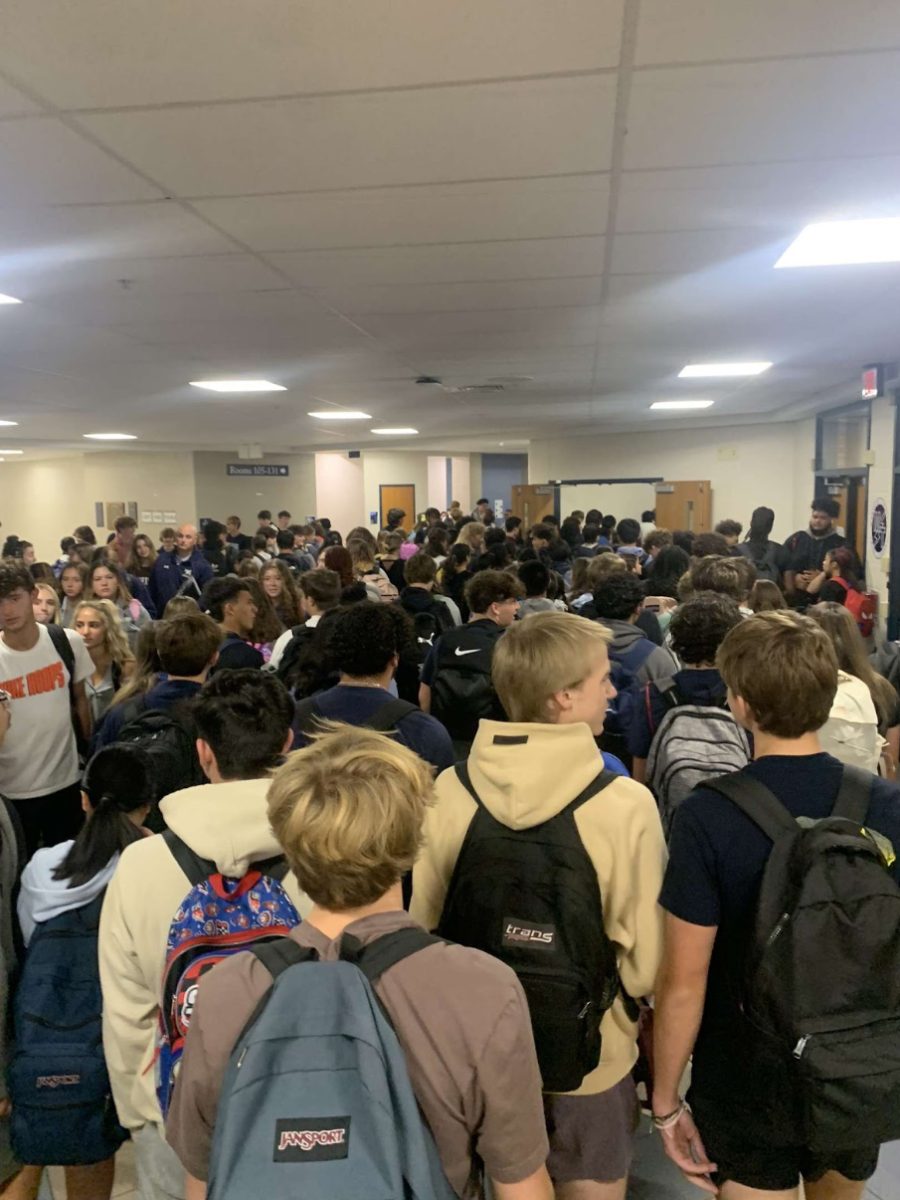One minute. 60 seconds. A slight change. An insignificant amount of time. But is it? Try sprinting or public speaking for a minute straight. That minute becomes very long. When the administration told students of the new bell schedule, it was very confusing. Instead of a five-minute break between classes, it’s now four, with the 30-second warning bell removed. That minute we needed to make the journey across the school was taken away in the name of urgency. But were we not already urgent? Is loitering in hallways not still an issue? The bell schedule was an unnecessary and harmful change that only will and has increased stress in students.
For instance, being tardy for simple matters of time and distance has seemingly gone up this year. Without the minute cushion, students struggling to get across the school in time have become a problem. In my schedule, many trips between classes are lengthy. For example, between the first and second periods, I need to walk from the end of the e-wing (room 228) to the opposite side of the building and room 178. When that is the reality of a high school schedule and how our school is set up, it is reasonable to expect adequate time to get from class to class. In the previous bell situation, the process was just enough to make it before the period started.
While most students have a phone, with the decreased time between periods, it’s difficult to check it when we are forced to hurry. If we can’t even know how close we are to being tardy, how can we avoid it? There are so many variables that affect travel each day, and the necessary amount of time to be on time may vary. The warning bell and extra minute ensure the possibility of making it to class.
Besides, MT is already known for having committed students. According to 2019-2021 data collected by US News and World Report, we far exceed state averages on standardized testing by, on average, 20-25%, showing a dedication above other high school students. We are also quite accomplished in our extracurriculars. Township has multiple reigning state champions such as Bowling and Unified Track, MTPA performs multiple complex shows a year and has 65+ clubs, and that’s not even including non-affiliated activities such as youth groups and clubs. We have a lot of investment and participation in outside activities—there is even more stress added. Since the statistics show we are more academically accomplished than other students and are very involved in our communities, why must the unfair burden of decreased travel time be placed on us outside the classroom? Why must we have more stress? Why was this even created in the first place if it hurts the students themselves?
The administration does provide a reason for the change. In a statement on the new change, the new schedule was: “To provide a greater sense of purpose and urgency for transition between classes to reduce hallway gatherings and misbehavior.” While this statement isn’t entirely meaningless, the “sense of purpose and urgency” is only shown by the students who care about getting to class—and they were reliably doing that either way. This change was entirely unnecessary because it only punishes students who do feel the need to be on time.
The ones who tend to loiter will do it with or without a shortened bell time. The people who try to get to class are the same ones on teams, in clubs, and performing for the school; they are already giving enough effort for the school. In high school, the atmosphere is always important. When learning is prioritized and encouraged positively, productivity will follow. When students can independently and calmly acquire knowledge, it is to the benefit of everyone around them. Students must feel comfortable and safe in the school to maximize their learning potential. Safe refers to the mental and social aspects of the school, although the increased crowding and traffic to get to classes could technically be considered a safety risk.
While I could continue to offer my own opinions on the matter, it’s much more important that the views of the student body are shared. A survey I created was sent out to students via The Township Times’ Instagram to collect their opinions on the schedule change, with 39 responses recorded. The results were not particularly positive: out of the responses, only one believed the schedule change was necessary, and two that four minutes was an adequate amount of time between classes. On the topic of hallway loitering, the opinions were slightly more split but still heavily in favor of the change having little to no effect. “The people who loiter in the hallways will continue to do the same thing no matter [if] the bell schedule changes,” said junior Sarah Ebersole. The people who are motivated to get to class will try, but it is truly difficult under the new schedule. Yes, the information is a small sample size, but it represents the general feelings of the student body.
With nearly 90% of people who responded claiming they have a harder time getting to class, it seems to be a general agreement that the change is inefficient. While it was created to minimize travel time, the decreased time is simply not enough for many students. When a change affects how well the students function, we must question why it was even altered in the first place. “I haven’t even had the chance to use my locker this year because of it,” said junior Sofia Shorter. “Please, we need to change this because it has made school worse.” The change is unfair to students and the school as a whole.
It is important the school address the concerns of its students and fix this issue. The schedule change has backfired to the point of inconvenience and stress, which is never a great atmosphere to learn in. As a famous expression goes, “If it ain’t broke, don’t fix it.” The old bell schedule was effective and reasonable; there was no need to “fix” it. This change most definitely did not.















Cole Richards • Oct 22, 2023 at 11:42 am
I honestly 100% agree with this, I can’t even make it from the cafeteria to the end of the e-wing because of how flooded the hallways feel. The friends I walk with to that class all agree that if we had that extra minute, we would get there on time everyday, so this is definitely a change that needs to happen.
Thomas Kauffman • Oct 20, 2023 at 11:42 am
I think that the administration has a bad habit of seeing an average instead of differentiating different groups of people, this is demonstrated in rules regarding phones, hoods/hats, and the hallway loitering that the article went over. They see 4 people in a class of 25 who have no interest in the lesson, with hoods up, watching unrelated content, and arriving late, and decide the only course of action is to make 12 rules that hurt the 21 people that just wants to express themselves with a hat, use the calculator app every once and a while, and have one time in the day that they get to see a friend. The worst part is that the 4 people still do what they want even with the rules. I think a really good solution could be, for the average student at least that grades/teacher recommendation/other student recommendation could get you different privileges. These could target the bad people and maybe even give them an incentive to do better. Privileges could include, phones, hats, less iPad security, choice of seat, and lateness leniency. This would obviously need more in depth discussion to become a thing but I personally believe it could work well.